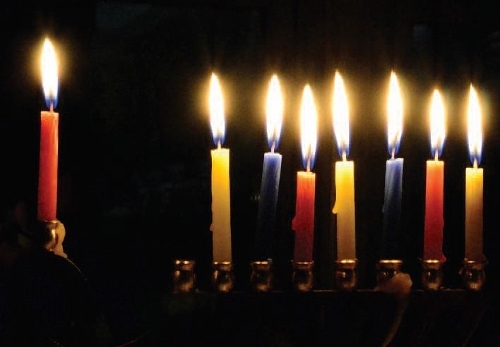Chanukah 5776
In the "Al ha-nissim" paragraph, which is added to our prayers and birkat ha-mazon on Chanukah, one emphasizes the qualitative differences between the victors - the Hasmoneans - and those defeated - the Hellenists. We declare, "You submitted the mighty into the hands of the weak, the many into the hands of the few, the impure into the hands of the pure, the wicked into the hands of the righteous, and the evil ones into the hands of those involved in Your Torah." In all the pairs of contrasts in this list, the specific point of distinction is clear and obvious. Mighty is the exact opposite of weak, many the direct opposite of few, and so on. The final clause, however, appears to break the pattern: "the evil ones into the hands of those involved in Your Torah." Wherein lies the specific point of contrast between "zeidim" - "evil ones" and "osekei Toratekha" - "those involved in Your Torah"?
R. David Silverberg (http://etzion.org.il/vbm/english/archive/salt-bereishit/10-6miketz.htm) cites the explanation of R. Chaim Friedlander of the Ponevezh Yeshiva. R. Friedlander, in his Sifrei Hayyim, surveys the Biblical usage of the term "zeidim" and reveals that it denotes a specific form of evil; it describes those who scorn and mock. For example, King David writes in Psalms (119:51), "Zeidim helitzuni ad me'od" - the scoffers mocked me very much. Thus, the Rabbi's reference to the Greeks as "zeidim" reflects their scornful and derisive attitude towards the Jews. The previous clause in "Al ha-nissim" describes them as "resha'im," a generic term for wickedness, referring to their intrinsic evil qualities. "Zeidim," by contrast, relates to their having mocked Am Yisrael.
What were the origins of this contempt harbored by the Greeks towards the Jewish people? Rabbi Friedlander claims that this attitude involved specifically the Jews' approach to Torah scholarship. The Greeks, as we know historically, held academia in the highest esteem. They had very high regard for wisdom, knowledge and scholarship. In this sense, they and the Jewish people shared a common value. One fundamental difference, however, set the Greeks' attitude completely apart from the Jews' perspective. The Jews valued learning itself as a sacred act. Whereas the Greeks valued knowledge, they could not appreciate the importance of the act of learning - the value of toil and intensive effort in Torah scholarship. For them, learning was geared exclusively towards the end result, the practical conclusions and applications of their study. They ridiculed the reverent attitude Benei Yisrael have always shown to the very act of Talmud Torah (Torah learning), they belittled the notion of tireless effort in even theoretical debate and discourse without concrete, practical results. They ridiculed as well how the Jews viewed their books – with love and holiness.
My father, the late Rabbi Prof. Norman E. Frimer, once had a discussion with a noted academic about the essential difference between secular and Torah scholars. "After all," said the academic, "we are very much alike: we both cherish scholarship and knowledge." To which my father responded: "When our books fall to the floor, we kiss them!"
In this "Al ha-nissim" prayer lies the critical distinction between the Jewish and Greek attitudes towards learning, the difference between reverence and disdain. This paragraph thus distinguishes between "zeidim" - the Greek scoffers - and "osekei Toratekha" - those "involved" in the Almighty's Torah. We speak here not of "lomedei Toratekha" - those who merely study Torah, but rather those who involve themselves in Torah. This refers to an emotional attachment, a love and passion for learning, a drive to invest effort and hard work in Torah study. It reflects a view of Torah as a religious experience and as a way to be in communication and confrontation with the Divine.
Chag Urim sameah to all.








Comments